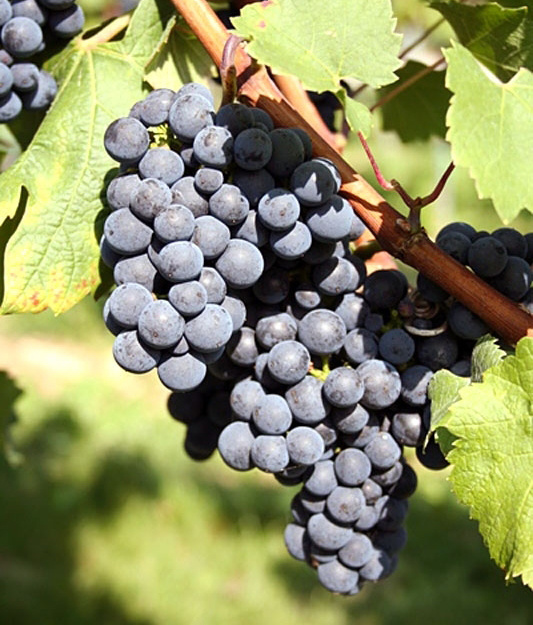Wine manufactory Alois Metz with the PIWI varieties: Cabaret Noir and Solaris
https://www.bonvinitas.com/media/reviews/photos/thumbnail/780x480c/2b/28/58/weinmanufaktur-alois-metz-42-1748182950.jpgNo typo, not Cabernet, but Cabaret
 Cabaret Noir. Photo: Rebschule V & M Freytag GbRYes, it is a so-called PIWI variety, the Cabaret Noir. The name comes from "pilzwiderstandsfähig" (fungus-resistant) and means that these vines, which are largely new breeds, require significantly less pest control because they are especially resistant to the two very aggressive fungal pests Oidium and Peronospora. "In 2011, after numerous trials here and there, it was finally ready," Metz recounts, "I was able to lease a small vineyard plot of 25 ares on a gentle south-facing slope in our district Herxheim. But which vines to plant? I wanted to practice near-natural viticulture and produce organic wine." His path led him to the Volker Freytag nursery in nearby Neustadt an der Weinstraße. Freytag is closely connected with the well-known Swiss vine breeder Valentin Blattner, who bred the Cabaret Noir variety (originally called Cabernet Noir) in 1991. So after long consideration and discussion, Metz planted Cabaret Noir as the red and Solaris as the white vines in his vineyard.
Cabaret Noir. Photo: Rebschule V & M Freytag GbRYes, it is a so-called PIWI variety, the Cabaret Noir. The name comes from "pilzwiderstandsfähig" (fungus-resistant) and means that these vines, which are largely new breeds, require significantly less pest control because they are especially resistant to the two very aggressive fungal pests Oidium and Peronospora. "In 2011, after numerous trials here and there, it was finally ready," Metz recounts, "I was able to lease a small vineyard plot of 25 ares on a gentle south-facing slope in our district Herxheim. But which vines to plant? I wanted to practice near-natural viticulture and produce organic wine." His path led him to the Volker Freytag nursery in nearby Neustadt an der Weinstraße. Freytag is closely connected with the well-known Swiss vine breeder Valentin Blattner, who bred the Cabaret Noir variety (originally called Cabernet Noir) in 1991. So after long consideration and discussion, Metz planted Cabaret Noir as the red and Solaris as the white vines in his vineyard.
Lots of nature
Metz: "The vines are now in their ninth year and thriving." Leaf work, harvest, and winemaking are practically all done by hand, and pest control is reduced to a minimum. The vineyard soil consists of sandy loam/loess. "Where it is too sandy, I add dried horse manure," says the hobby winemaker. Yes, it is more than a hobby. The vines and the wine are his life, and he also has his horse. "Of course, I limit the yield by reducing the grapes to about 50 liters per are, because the Cabaret is quite productive," Metz continues. For pressing, he uses a small old hand-operated press. "In the cellar, I do not rack (drawing the clear must off the yeast and pumping it into another container – editor's note), but let the yeast settle and the wine clarify itself. This also remains so in the barriques until bottling, for which I only use a filter," Metz explains further. So from start to finish, everything is completely natural, and because he ferments his wines fully dry, he does not have to worry about secondary fermentation in the bottle and uses a minimum amount of sulfur. A hidden gem!
Text: Dieter Simon, Editor-in-Chief and Publisher bonvinitas. Photos as indicated, others PR





